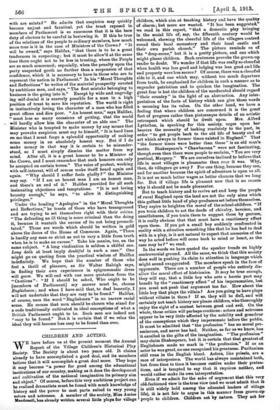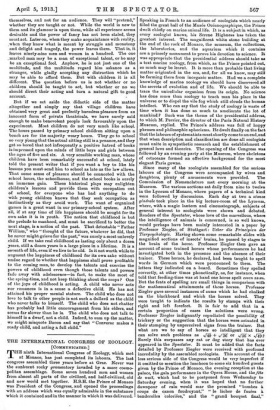CHILDREN AND ACTING.
WE have before us at the present moment the Annual Report of the Village Children's Historical Play Society. The Society is about two years old. It claims already to have accomplished a good deal, and its members believe that it will accomplish a great deal more. They hope it may become "a power for good among the educational institutions of our country, making as it does the development and cultivation of the national imagination its primary aim and object." Of course, before this very ambitious project can be realized dramatists must be found with much knowledge of history and the power to east parts suited to very young actors and actresses. A member of the society, Miss Amioe Idacdonell, haa already written several little plays for village
children, which aim at teaching history and have the quality of charm; but more are wanted. "It has been suggested," we read in this report, "that a domestic play bringing in the social life of, say, the fifteenth century would be welcomed, showing the cheerful life of the villagers centred round their local monastery and their local castle and their own parish church." The picture reminds us of the "drop-scene," but it is a pretty picture, and one which might please children. Such sentences provoke the grown-up reader to doubt. We wonder if that life was really so cheerful when health was less good and lodging was less good and life and property were less secure? Of course, there was a cheerful side to it, and one which may, without too much departure
from truth, be emphasized for children in such a manner as to engender patriotism and to quicken the imagination. The
great fear is lest the children of the uneducated should regard "their country" in the light of an abstraction. Any inter- pretation of the facts of history which can give those words
a meaning has its value. On the other hand, we have a
feeling that where children are concerned it is the great fact of progress rather than picturesque details of an artistic retrospect which should be dwelt upon. Mrs. Alfred Lyttelton, in speaking for this society, urges upon her hearers the necessity of looking resolutely to the past, in order "to get people back to the old life of beauty and of art which always in former times existed in England." That "the former times were better than these" is an old man's motto. Shakespeare's " Chawbacons " were not fascinating, though even then there were people to exclaim, "You are very poetical, Margery." We are ourselves inclined to believe that life in most villages is pleasanter than ever it was. Why, then, do villagers go away P For one thing, because they can, and for another because the spirit of adventure is upon us all. It is not so much better wages as better chances that we long for. But if village life is pleasant now that is no reason why it should not be made pleasanter.
But to teach history and to revive art and keep the people of rural England upon the land are not the only aims which this gallant little band of play-producers set before themselves. They aspire to heighten the moral of the school-children. "If you train children to act the deeds of chivalry, heroism, and unselfishness, if you train them to suggest these by gesture, it is really obvious that that must have a reactionary effect upon them. If you get a small boy suddenly confronted in reality with a situation something like that he has had to deal with in a play, is it not natural to expect that memories of the way he acted before will come back to mind or heart, as the case may be?" we read.
In the words we have quoted time speaker treads on highly controversial ground. All the same, we think that this society does well in pushing its claim to attention in language which might sound exaggerated. The members speak in the face of opponents. There are a number of people who entirely dis- allow the moral effect of histrionics. It may be true enough, they will say, that a little boy who acts a heroic part may benefit by the "reactionary effect" of his impersonation, but you must not push that argument too far. How about the little boy that plays the villain ? Are you going to have plays without villains in them ? If so, they will be dull, and will certainly not teach history nor please children, who thoroughly enjoy the sight of a contest between good and evil. On the whole, these critics will perhaps continue : actors and actresses appear to be very little affected by the nobility and grandeur of the conceptions which they impersonate before the public. It must be admitted that "the profession" has no moral pre- eminence, and never has had. Neither, so far as we know, has it excelled in the gifts of the imagination. "The profession" may claim Shakespeare, but, it is certain that that greatest of Englishmen made no mark in "the profession." If as an actor be was great, no one recognized his greatness. Puritan is still runs in the English blood. Actors, like priests, are a race of interpreters. The world has always maintained both, but from time to time it becomes restive under their preten- tious, and is tempted to say that it requires neither, and would rather make its own interpretation.
Even if we admit for the sake of argument that this very old-fashioned view is the true view (and we must admit that it is still widely held among the educated leaders of village life), it, is not fair to argue in this manner from grown-up people to children. Children act by nature. They act for
themselves, ani not for an audience. They will "pretend," whether they are taught or not. While the world is new to them and its glamour is upon them, while all experience seems desirable and the power of fancy has not been staled, they must act. Later on, when they make acquaintance with reality, , when they know what is meant by struggle and monotony and delight and tragedy, the power leaves them. That is, it leaves ninety-nine men and women in a hundred. The one , marked man may be a man of exceptional talent, or he may be an exceptional fool. Anyhow, he is not just one of the multitude, and the multitude regard him askance as a stranger, while gladly accepting any distraction which he may be able to afford them. But with children it is all different. The question before us is not whether or no . children should be taught to act, but whether or no we should direct their acting and turn a natural gift to good account.
But if we set aside the didactic side of the matter altogether and simply say that village children have obtained very great and perfectly harmless pleasure from an innocent form of private theatricals, we have surely said enough to make benevolent people look favourably upon the experiment. Most children do not very much like schoel. The hours passed by primary school children sitting upon a bench are for the majority weary hours. They go to school so very ybung that the actual sitting still is a penance, and they get so bored that not infrequently a positive hatred of books is impressed upon the minds of little boys and girls between the ages of five and six. A very sensible working man, whose children have been remarkably successful at school, lately told the present writer that if you want a boy to like his lessons you must send him to school as late as the law allows. That some sense of pleasure should be connected with the school hours, the schoolhouse, and the school books is surely an immense gain. These historical plays may enlighten children's lessons and provide them with occupation out of school, for everyone who has had anything to do with young children knows that they seek occupation as instinctively as they avoid work. The want of organized games is a great want in our primary-school system. After all, if at any time of life happiness should be sought for its own sake it is in youth. The notion that childhood is but the prelude to manhood, and must be sacrificed to better the next stage, is a notion of the past. That detestable "Father William," who "thought of the future, whatever he did, that he never might grieve for the past," was surely a most unlovely child. If we take real childhood as lasting only about a dozen years, still a dozen years is a large piece in a lifetime. It is a seventh of life, even if we live to be old. Is it not worth while to augment the happiness of childhood for its own sake without undue regard to whether that happiness shall prove profitable to the coming man, to develop the talents and exercise the powers of childhood even though those talents and powers fade away with adolescence—in fact, to make the most of the spring-time, and not keep thinking about the crops ? One of the joys of childhood is acting. A child who never acts nor romances is in a sense a defective child. He has not attained his proper mental stature. The child who does not love to talk to other people is not such a dullard as the child who never talks to himself. The child who does not chatter has probably had little encouragement from his elders, and seems far slower than he is. The child who does not talk to himself is a dwarf, not a child. Indeed, to BUM up the matter, we might misquote Bacon and say that "Converse makes a ready child, and acting a full child."















































 Previous page
Previous page